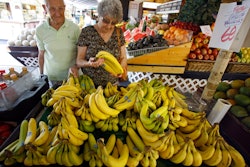WASHINGTON, D.C. — Americans love to drink their wine. In fact, according to the Wine Institute, there are around 856 million gallons of wine consumed each year in this country. And that’s a number that has been steadily growing for decades. In 1992, the average was 476 million gallons per year, and in 1972 it was 337 million gallons per year. While the love of wine hasn’t changed, some things have, including those looking for wines that are sustainably produced.
“As people become more environmentally conscious about various issues they are interested in products that are more sustainable,” explained Danny Lledo, manager of Slate Wine Bar & Bistro, located in the Glover Park area of Washington D.C. “The good news for wine lovers is that there are some great sustainable wine options available, so there is no compromising on quality or flavor.”
When it comes to opting for sustainable wine options, here are some tips to keep in mind:
- Know what it means. Not everyone realizes what it means for a wine to be sustainable. Being organic is not always the same thing as being sustainable. Wines can be organic and still not be sustainably produced. In order for a wine to be sustainable it needs to be one that has been produced in a way that it will be able to keep being produced in the long term. In other words, consideration has been made when it comes to maintaining soil quality, biodiversity, pollution, etc. Sustainable wines will be produced without the excessive use of harmful chemicals and damage to the environment.
- Do your homework. The best way to learn about sustainable wines is to spend some time researching them online. That way companies can be researched in order to learn more about their practices. If at all possible, visit the vineyard to see first-hand what is being done to produce the wine sustainably.
- Try several. Just like traditionally produced wines, not all are created equal. Be sure to try several to see which ones are preferred. Most people agree that wines produced sustainably tend to have a better taste, which may be a benefit of using less chemicals and having higher quality soil.
- Ask for help. When shopping or dining out, ask for assistance when it comes to selecting a good sustainable wine. Those who work in areas where it is offered will usually be able to answer questions and point people in the right direction for a quality selection.
“Sustainable wines are even available when dining out,” added Lledo. “We are happy to offer a great selection of them here at Slate that people can choose from, topping off an already great meal.”
In addition to offering a wine list that includes sustainable options, Slate offers a menu that features daily seafood specials and dishes made with locally grown ingredients. They are available for private parties of up to 125 guests and offer a private party menu. For more information or to book reservations, visit their site at: www.slatewinebar.com.
About Slate Wine Bar & Bistro
Located in the Glover Park area of Washington, D.C., Slate Wine Bar & Bistro features a varied menu that includes options made with locally grown ingredients. They also feature a wine selection that includes sustainable wines. They are able to accommodate small to large parties, including private events with up to 125 guests. For more information or to book a reservation, visit their site at: www.slatewinebar.com.






















